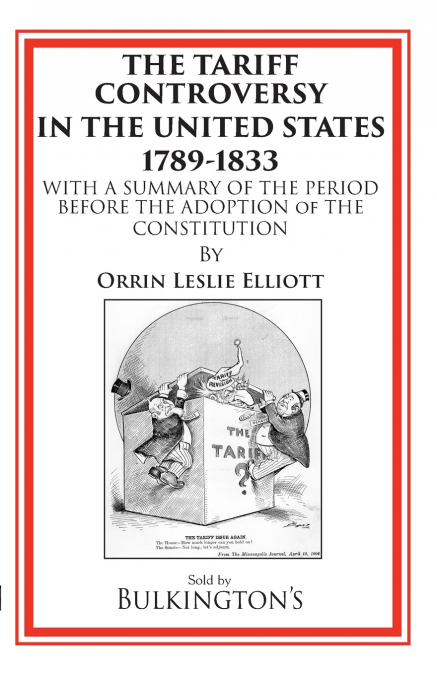
P.H.D. Orrin Leslie Elliott
The Tariff Controversy in the United States 1789-1833: With a Summary of the Period Before the Adoption of the Constitution by Orrin Leslie Elliot, PhD, was originally published in 1892. It is altogether a scholarly monograph, formerly published by Leland Stanford Junior University Press. It is a well researched chronicle of the history of the British mercantile system, tariffs, protection, and international trade in the colonies and the early American Republic. It covers the earliest colonial period and ends with the Nullification Crisis of 1833, when Andrew Jackson faced off against South Carolina and John Calhoun over the issue of tariffs, the National Bank, and secession.What you will find is that every single President supported tariffs. George Washington, John Adams, Thomas Jefferson, James Madison, James Monroe, John Quincy Adams, and Andrew Jackson all supported tariffs. Some of them, like James Madison, really preferred ’free trade,’ but understood it was not possible in practice. On nearly every page there are direct quotes from the Founders, from Congressional proceedings, on the issue of tariffs, protection, and free trade. The author painstakingly gives quote after quote from all sides of the issue.What becomes apparent is that the Early American Republic could not have survived without tariffs and protection, because Great Britain at the time was powerful and sought to commercially dominate American markets. The author demonstrates that the Founders came to understand this quite quickly, and it was one reason why they moved past the Articles of Confederation to create a stronger Federal government that could regulate domestic and international trade.Since the issue of free trade vs. protection has become extremely relevant today, this book brought back to the reading public. We will conclude with two quotes from the book, from the Founders:'Much indeed it is to be wished, as I conceive, ... that no regulations of trade, that is to say, no restrictions on imposts whatever, were necessary. A perfect system is the system which would be my choice. But before such a system will be eligible, perhaps, for the United States, they must be out of debt; before it will be attainable, all other nations must concur in it. Whilst any one of these imposes on our vessels, seamen, etc., in their ports, clogs from which they exempt their own, we must either retort the distinction or renounce, not merely a just profit, but our only defence against the danger which may most easily beset us.'-James Madison'[B]oth France and England have shown a constant disposition to take a selfish and partial advantage of us because of them, to turn them to the diminution or destruction of our own means of trade and strength. I hope we shall be the dupes no longer than we must. I would venture upon monopolies and exclusions, if they were found to be the only arms of defence against monopolies and exclusions.'-John AdamsThis is a new edition of the public domain book that was originally published in 1892.This new edition includes:A new Foreword written by the publisherSeveral footnotes illuminating the references made by the author.New format, layout, typesetting.Bulkington Book’s mission is to build a bridge into the past, before film, television, copyright, and internet swallowed up the world. We found this story worthy of revival, and we hope you find it worth your while.